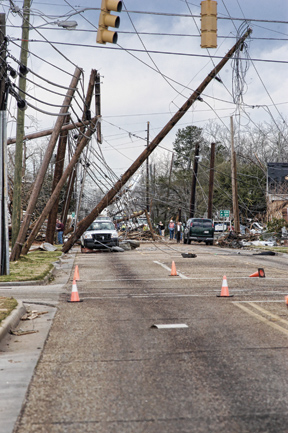SEVERE WEATHER? BE PREPARED WITH AN EMERGENCY PLAN

he National Weather Service and the Alabama Emergency Management Agency teamed up with other organizations Feb. 22-26 to sponsor Severe Weather Awareness Week in Alabama. The focus of the week was to inform the public about severe weather and how they can best be prepared. Planning and awareness will increase the chances of survival during a storm.In Alabama, severe weather was reported on 99 days in 2009. Last year, 72 tornadoes were reported on 22 days, thunderstorm wind damage was reported on 71 days, severe hail was reported on 38 days and flash floods were reported on 56 days. The National Weather Service issued a total of 1,543 warnings for Alabama in 2009. Of those, 296 were tornado warnings, 966 were severe thunderstorm warnings and 281 were flash flood warnings.Each storm preparedness plan should consist of five parts: a thorough knowledge of safety rules, designation of the best available protective area, a reliable method of communication to receive and exchange information, an emergency supply kit and drills to test and practice the plan.”It’s good to have a safety plan in place in case there is the threat of severe weather,” said Mark Rose, a meteorologist with the National Weather Service in Birmingham.Rose said when families are designating a special place to go during a storm, the place should be on the lowest floor of the house in an interior room without windows, such as a closet or bathroom.An emergency kit should consist of basic items for the whole family. Some supplies that are useful in an emergency kit include flashlights, batteries, a portable radio, food and water for three days per person and a first aid kit.Families can also purchase a weather radio to use all the time, because the weather radio will alert them of severe weather in the area.”The weather radio comes in handy, especially at night when you may not necessarily be in front of the TV or you may be asleep,” Rose said. “A lot of times it just gives you a heads up that severe weather is coming, and you can turn on your TV or radio to get more details.”
As part of your family’s plan, it is important for each person in the family to understand the difference between storm watches and warnings. When a storm watch is issued, it means conditions are favorable for severe weather. You should pay careful attention to weather forecasts and be more aware because bad weather conditions could develop. A warning means severe weather has been indicated by radar. A warning is the time to put your severe weather emergency plan into action.If you are traveling in your car when the storm hits, you may not be able to put your plan into action. When it comes to making a decision between staying in your car or getting out to find a ditch, there are dangers in both. If you stay in your car, there is still the threat of high winds, flying debris and broken glass. However, in a ditch you also face the possibility of getting hit by debris. The NWS recommends to avoid driving if severe weather is in the forecast, and instead stay near a sturdy shelter.”Really being outdoors anytime during a thunderstorm is dangerous due to the threat of lightning,” Rose said.
Once the storm is over, it is still necessary to take precautions. The most important step is to remain calm. It’s also important to treat injuries as quickly as possible, and call for medical attention if needed. To prevent additional injuries, wear sturdy shoes, long sleeves and gloves when handling debris from the storm, and rope off any areas that are dangerous.Keep people and pets away from downed power lines. If you see frayed wires or smell something burning, turn off the electricity at the main circuit breaker. Do not light candles or matches in your home, as these could cause something to ignite. Especially avoid using these if you smell gas leaking. If you think you could have a gas leak, shut off the main gas valve, open the windows and leave the house. Contact authorities with any problems you find in your house or the surrounding areas.
